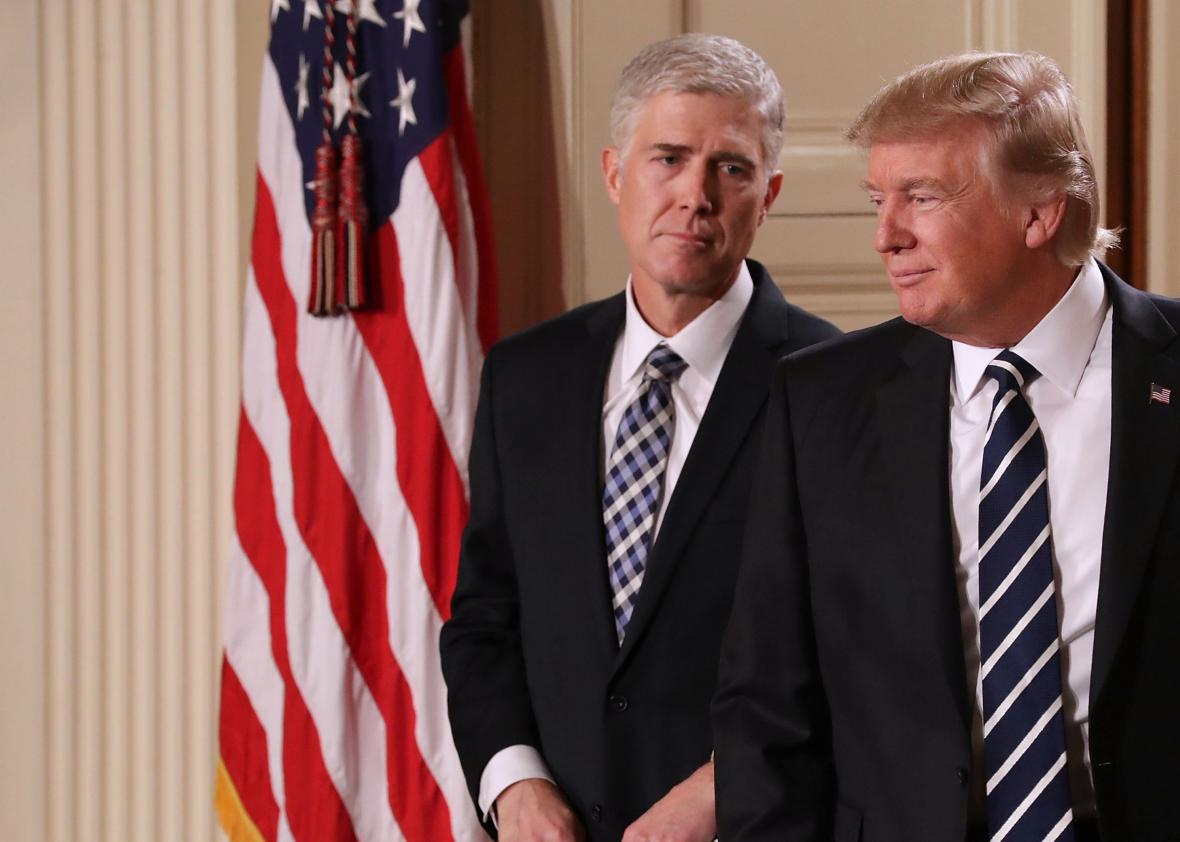On Saturday, the New York Times published a very strange story by Sheryl Gay Stolberg titled “Gorsuch Not Easy to Pigeonhole on Gay Rights, Friends Say.” The article notes that Neil Gorsuch, the federal appeals court judge whom Donald Trump nominated to sit on the Supreme Court, has gay friends and is not outwardly homophobic in his interactions with them. Indeed, Stolberg explains at length, Gorsuch is actually friendly with these gay friends, congratulating them on their marriages and inviting them to stay in his guest room. Even better, he lives in Boulder, Colorado—a liberal city!—and goes to a church that “welcomes gay members.”
“That leads some friends to wonder if his jurisprudence might be closer to that of Justice Anthony Kennedy,” Stolberg writes, “who has carved out a name for himself as the court’s conservative defender of gay rights.”
The thesis here appears to be that Gorsuch, unlike his friend and idol Antonin Scalia, is very close with several openly gay people—and that these relationships might lead him to rule in favor of gay rights. This conflation of personal and jurisprudential views is misguided and befuddling. There is little reason to think that Gorsuch’s friendships with gay people will affect his legal views one way or the other. And it is especially unwise, in the run-up to his confirmation battle, to pretend that Gorsuch’s associations will somehow push him toward a more progressive stance on LGBTQ rights.
There’s a reason why each gay member of Gorsuch’s squad is eager to point out that he is capable of acting civilly around homosexual humans: The man he may replace, Scalia, could not. Scalia’s gay rights dissents were notoriously homophobic; in them, he compared homosexuality to murder, incest, drug addiction, and bestiality, and he suggested that intimacy between same-sex couples was no more significant than the bond between roommates. Scalia also admitted that while he had friends who he “very much suspect[ed]” were “homosexual,” none of them had come out to him. (I wonder why?) Gorsuch, his friends declare, isn’t like that at all. And so, they conclude, because he is kind to the openly gay people in his life, he might vote to uphold their constitutional rights.
One rebuttal to this premise can be delivered in two words: John Roberts. The chief justice has openly gay friends as well as a lesbian cousin. He has two teenage children who are, in all probability, accepting of LGBTQ people. He lives in the liberal Maryland suburbs of Washington. He is not homophobic in person or on the bench. And yet, when a majority of the court struck down same-sex marriage bans, Roberts spewed vicious antipathy, comparing the majority opinion to the infamously cruel overruled decisions Dred Scott v. Sandford and Lochner v. New York.
“If you are among the many Americans—of whatever sexual orientation—who favor expanding same-sex marriage,” Roberts concluded, “by all means celebrate today’s decision. … But do not celebrate the Constitution. It had nothing to do with it.”
Gorsuch, a proud originalist, may hold Roberts’ views on constitutional protections for gay people—namely, that they do not exist. Or he may agree with another conservative originalist, Federalist Society co-founder Steven Calabresi, that the Constitution compels legal recognition of same-sex marriages. Either way, his friendships with gay people tell us nothing about the matter. They tell us only what we already know: that Gorsuch is a decent and likable person whose jurisprudence, while possibly just as reactionary as Scalia’s, will be swathed in much gentler rhetoric.
How can we uncover Gorsuch’s genuine beliefs about LGBTQ rights before he is elevated to the bench? Michelangelo Signorile argues that senators must ask him about gay rights, and I certainly agree—but I doubt these queries will yield much useful information. Gorsuch is adept at concealing his beliefs: Shawn Trautman, an attorney who took Gorsuch’s legal ethics class at the University of Colorado Law School, told me he was “shocked to learn” that Gorsuch is conservative. “I spent an entire semester with him,” Trautman said, “and never once had an inkling of his political leanings.” (He gives Gorsuch high marks as an instructor.) Performative neutrality, of course, is a standard and important skill for professors—one that carries over into the confirmation context. Do not expect Gorsuch to show his cards when senators ask about gay equality.
Given this opacity, some LGBTQ groups have already professed opposition to Gorsuch’s nomination. Lambda Legal promptly objected to his nomination, citing decisions that require the government to accommodate the religious beliefs of employers who disapprove of birth control, as well as a 2005 op-ed evincing skepticism toward marriage equality litigation. Eric Lesh, the director of Lambda’s Fair Courts Project, told me Gorsuch’s opinion in Hobby Lobby—holding that corporations must be allowed to limit employees’ access to contraception through insurance—is “disqualifying,” as it indicates Gorsuch might also rule that anti-gay corporations have a religious right to discriminate.
“We can’t confirm a Supreme Court nominee who has ruled that the religious beliefs of employers can trump the law,” Lesh said. “You can’t support broad religious exemptions, criticize civil rights litigation, and still be considered a friend to LGBT people.”
I have no doubt that Gorsuch’s gay former classmates and clerks genuinely see him as an LGBTQ ally. But the fact remains that these amicable associations tell us virtually nothing about his jurisprudence. A review of his past decisions, on the other hands, reveals a judge who is quite skeptical of LGBTQ claims and hesitant to insist that the government be made to respect LGBTQ people’s dignity. These rulings and writings, while relatively scarce, tell us more about his legal convictions than any personal ties possibly could. And they do not give LGBTQ Americans much cause for optimism.
